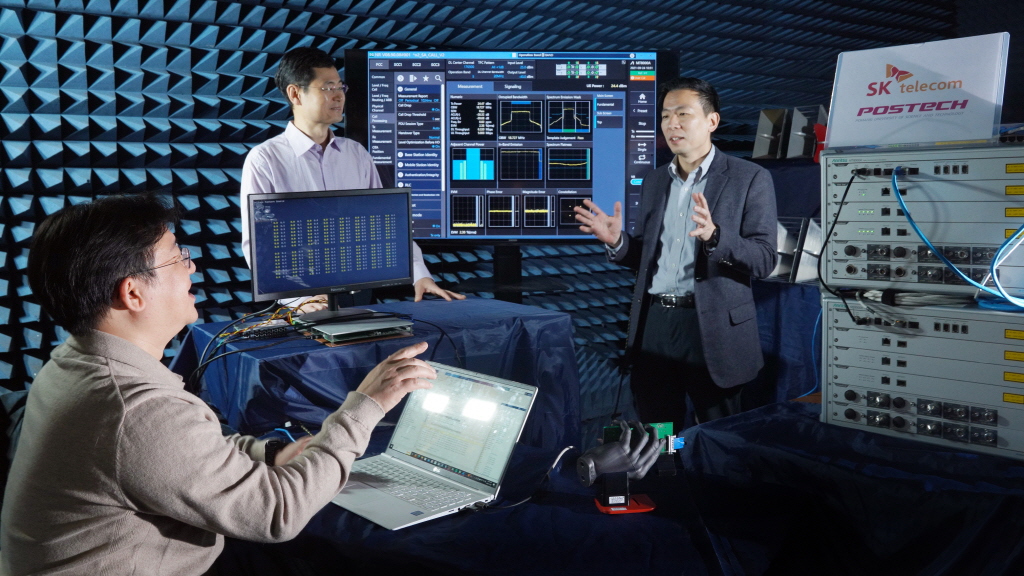SK텔레콤(대표이사 CEO 유영상)이 포스텍(포항공과대학교) 전자전기공학과 홍원빈 교수팀과 스마트폰에 내장된 안테나 개수를 늘려 통신 성능을 높이는 기술을 개발, 실증에 성공했다. SKT는 실험실 환경에서 진행된 이번 실증에서 글로벌 통신 계측 장비 회사인 안리쓰(Anritsu)의 측정 장비를 활용해 기존 스마트폰과 동일한 조건에서 데이터 전송 속도가 유의미하게 향상되는 것을 확인했다.
SKT·포스텍, 안테나 4개 최대 8개까지 확장 기술 개발
온디바이스 AI를 이용해 스마트폰 안테나 전송 성능을 실시간으로 최적화하며, 품질을 높이는 기술이 개발돼 향후 국내 통신 경쟁력 상승이 기대된다.
SK텔레콤(대표이사 CEO 유영상)은 포스텍(포항공과대학교) 전자전기공학과 홍원빈 교수팀과 스마트폰에 내장된 안테나 개수를 늘려 통신 성능을 높이는 기술을 개발, 실증에 성공했다고 6일 밝혔다.
이번에 개발한 기술은 온디바이스 AI를 활용해 주파수 환경과 스마트폰 크기를 기존과 동일하게 유지하면서도 스마트폰에 통상적으로 탑재되는 4개의 안테나를 최대 8개까지 늘려 데이터 전송 품질을 향상시킬 가능성을 입증했다.
특히 이번 기술은 인공지능을 활용해 100만 가지 이상의 스마트폰 사용 환경에서 다양한 변수에 안정적으로 대응 가능하다. 이용자들의 자세와 환경 변화에 따라 달라지는 안테나 성능 문제 등에 대해 해결의 실마리를 마련해 활용 가능성이 높을 것으로 기대된다.
기존의 다중 안테나 확장 시도는 하드웨어 중심으로 이루어졌으나, 이번 연구는 AI를 활용해 새로운 가능성을 열었다.
SKT는 실증 단계에서 AI를 활용, 모바일 기기에 탑재되는 안테나 수가 많아질수록 상호 간섭이 증가하는 문제를 해결했다. 온디바이스 AI가 학습한 정보를 바탕으로 상호 간섭을 최소화해, 안테나 성능을 실시간으로 최적화할 수 있도록 했다.
SKT는 실험실 환경에서 진행된 이번 실증에서 글로벌 통신 계측 장비 회사인 안리쓰(Anritsu)의 측정 장비를 활용해 기존 스마트폰과 동일한 조건에서 데이터 전송 속도가 유의미하게 향상되는 것을 확인했다.
SKT는 이번 기술을 고도화해 이동통신 표준화 기술협력 기구인 3GPP 표준화를 추진하는 한편, 나아가 칩셋, 부품사, 스마트폰 제조사와의 협력을 통해 상용화를 위한 로드맵을 구체화할 계획이다.
이 밖에도 SKT는 인공지능 시대에 맞춰 온디바이스 AI 관련 연구를 꾸준히 이어가고 있다. 이러한 노력을 통해 지난해 9월 ‘리딩 라이트 어워드 2024’에서 온디바이스 AI 기반 스마트폰 소비전력 감소 기술로 ‘우수 AI 활용 사례’ 부분에서 수상한 바 있다.
류탁기 SK텔레콤 인프라 기술본부장은 “온디바이스 AI로 스마트폰 성능과 통신 기술이 한 단계 진화할 수 있음을 확인한 의미 있는 성과”라며 “앞으로도 혁신적인 선행 기술 연구를 통해 고객 만족도를 높이고 글로벌 시장에서 경쟁력 강화를 위한 6G, AI 인프라 핵심 기술을 확보할 것”이라고 밝혔다.
홍원빈 포스텍 교수는 “안테나의 수는 통신 경쟁력에 중요한 요소임에도 여러가지 현실적 제약으로 기술 발전에 어려움이 있었다”며 “온디바이스 AI와 안테나 확장 기술의 융합으로 기존 한계를 극복하고 다양한 부가가치를 창출할 수 있을 것“이라고 말했다.
